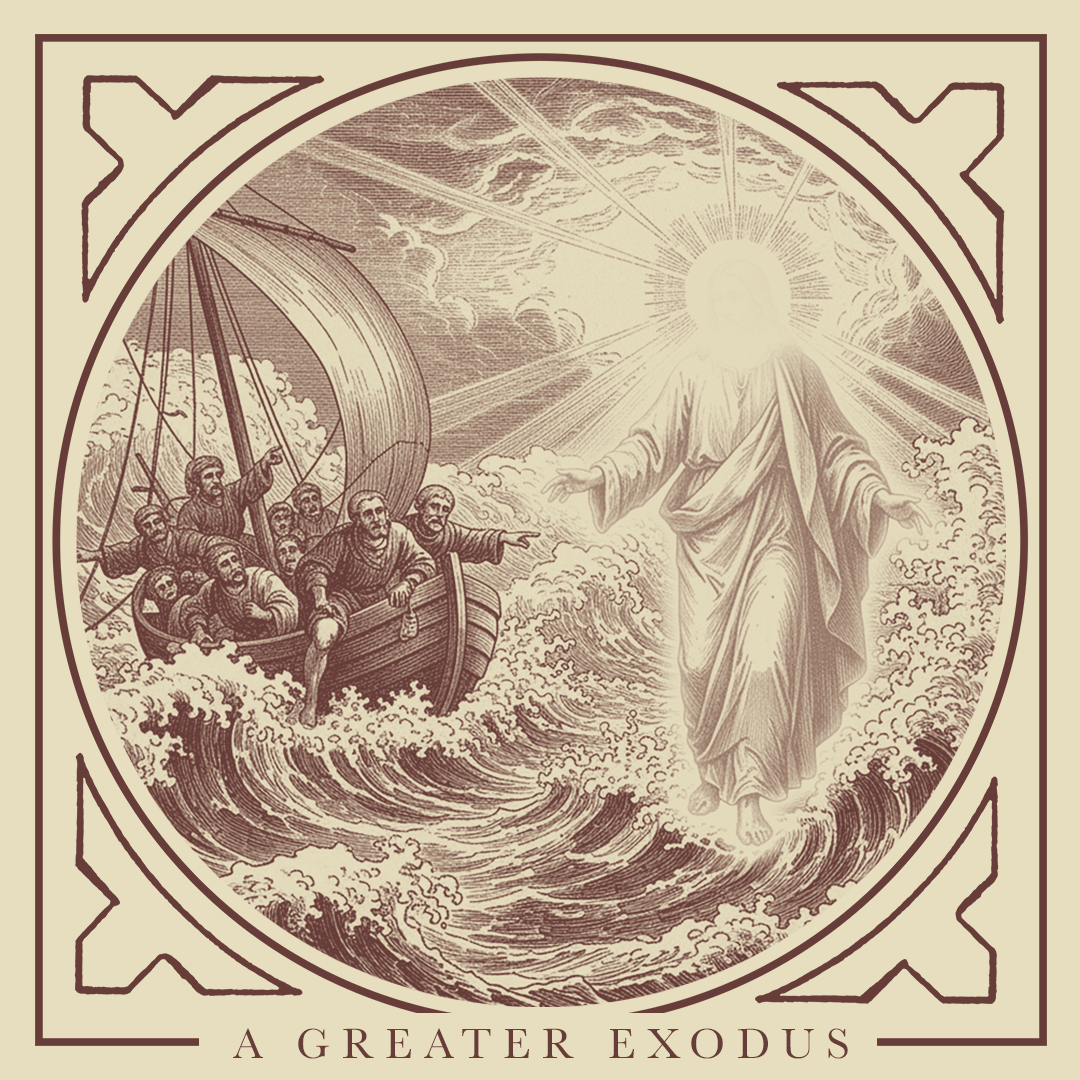
The Reversal of the Exodus in John’s Gospel
The Reversal of the Exodus in John 6:16–24
The Gospel of John is not a mere retelling of the Synoptic accounts. John writes with clear theological intention, shaping his narrative to reveal truths the other Evangelists do not emphasize. When he records Jesus walking on the water (John 6:16–24), he isn’t contradicting Matthew and Mark—he’s interpreting the event through a distinct lens. His omissions and inclusions are deliberate literary choices designed to show us that Jesus is the greater Moses, the prophet promised in Deuteronomy 18:15: “The Lord your God will raise up for you a prophet like me from among you; it is to him you shall listen.”
John’s Selective Storytelling
In Matthew and Mark, the scene unfolds with striking drama. Jesus compels His disciples to board the boat while He withdraws to pray. From the mountain, He watches them struggle against the storm until the fourth watch of the night, when He walks toward them on the waves. The disciples mistake Him for a ghost. In Matthew, Peter briefly walks on the water, falters, and is rescued. When Jesus enters the boat, the storm ceases and the disciples worship Him.
But in John’s Gospel, much of this is missing. John includes no mention of Jesus praying, of Peter’s venture onto the sea, or of the storm calming. Instead, he tells us simply that “they were glad to take him into the boat, and immediately the boat was at the land to which they were going” (John 6:21).
Why leave out such vivid details? Because John isn’t trying to write a carbon copy of the Synoptics. He’s constructing a theological portrait. His focus isn’t on the disciples’ fear or faith—it’s on Jesus’ identity. John wants us to see that the one who walks on the waters is not merely a miracle worker, but YHWH Himself, delivering His covenant people through the chaos.
A Reversal of the Exodus
John’s Gospel deliberately mirrors and reverses the Exodus story. The feeding of the five thousand corresponds to God feeding Israel with manna in the wilderness. But instead of bread that perishes, Jesus provides the imperishable bread of heaven—His own flesh.
In Exodus, God’s people are trapped between Pharaoh’s army and the sea. Moses, God’s chosen deliverer, stretches out his hand, and YHWH splits the waters so Israel might pass through safely. The sea that delivered God’s people became the grave of their pursuers.
John’s pattern reverses this. Jesus begins not at the sea but on the mountain, feeding the multitudes—“manna 2.0.” Then His disciples, representing the twelve tribes, face peril on the water. As in the Exodus, deliverance comes not through their strength but through divine intervention. Jesus, the true and better Moses, steps into the storm-tossed sea and brings His people safely to shore—not by splitting the waters, but by mastering them.
The parallels continue.
- After the Exodus, Israel sang songs of deliverance led by Moses and Miriam.
- Here, the disciples rejoice in worship as Jesus delivers them through the deep.
- In Exodus, Egypt pursues Israel and is swallowed by the sea.
- In John, the crowds pursue Jesus across the waters. Yet instead of being drowned, they are confronted with His hard teaching—“unless you eat the flesh of the Son of Man and drink his blood, you have no life in you” (John 6:53)—and many turn back, falling under divine judgment of unbelief.
The Greater Deliverance
By omitting the details about Peter and the calming of the storm, John directs our gaze away from the disciples’ reaction and toward Jesus’ revelation. The point is not human faith but divine identity. Jesus is not simply a prophet who calls upon YHWH—He is the presence of YHWH, walking upon the waters, rescuing His people, and bringing them to the promised shore.
Just as Moses led Israel from bondage to freedom, Jesus leads His people from death to life. But this time, the deliverance is not through a parted sea—it’s through His own body and blood. John arranges the story to show us that the true Exodus is not from Egypt, but from sin; not through the Red Sea, but through the cross.
Listen to Him
In this way, John 6 is not just a miracle story; it’s a revelation. It calls us to see Jesus as the prophet like Moses, and yet far greater than Moses—the Word made flesh, the Lord of the waters, the Bread of Heaven. The divine command remains the same as in Deuteronomy: “It is to Him you shall listen.” But this story demonstrates that Jesus is not only the prophet but also the king.
It is ironic that John 6:15 records the crowds attempt to seize Jesus and make Him king because He had filled their stomachs. They wanted a ruler who could bring material blessing, not a Savior who would demand faith. Knowing their hearts, Jesus withdraws to the mountain alone. He refuses a crown of bread and chooses instead the path to the cross.
John wants it unmistakable: Jesus does not become King because we make Him one; He is King because He is God. The seas obey Him, darkness flees from Him, and every trembling heart bows in worship before Him. The story ends not with the disciples triumphant, but with Jesus glorified—the One who walked upon the waters now reigns above them, and every storm, every heart, and every force of creation answers to His name.
Visit our home page: KingsFellowshipChurch.com
1001 Tipton Terrace, Ada, OK, United States, Oklahoma
